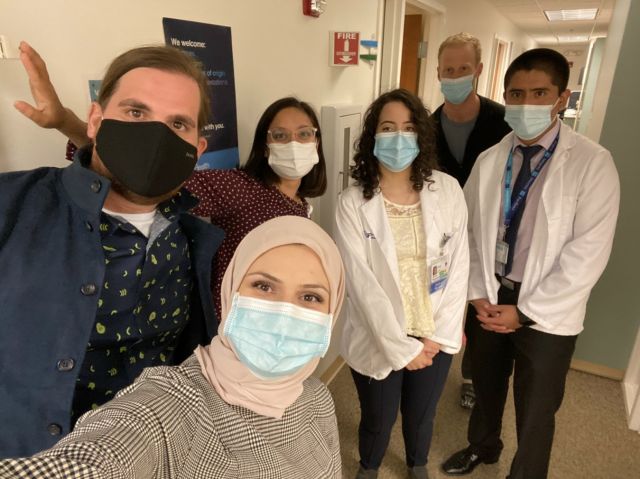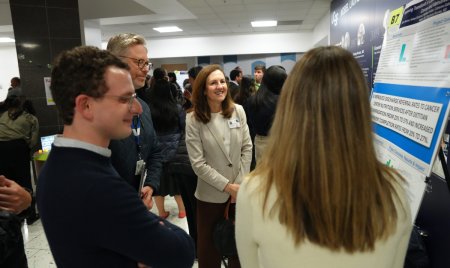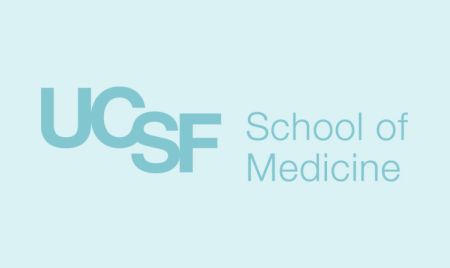Student-Run Initiative Helps Trauma Survivors Get Asylum

A team photo from one of the UCSF Human Rights Collaborative's past asylum clinics. Photo via @UCSF_HHRI on Twitter.
When Gabriela Steiner, a second-year medical student learned about the Human Rights Collaborative — a student-run organization that conducts forensic trauma evaluations for asylum seekers — she jumped at the opportunity.
“At UCSF you have the opportunity to really be involved and directly work with asylum seekers,” Steiner said. “That’s incredible, and something you can’t find at most schools.”
During COVID-19 HRC has had to adapt to changes, especially limits on some students’ ability to be present in in-person clinical environments. Students started a program to conduct remote medical evaluations of detained asylum seekers. While clients still needed to come to the in-person clinic for physical evaluations, they could undergo psychiatric evaluations via Telehealth. “We had to come up with new ideas of how we were going to do things while maintaining the quality of safety of our clients,” medical student Aaron Gallagher said.
In addition to giving students first-hand experience working with this population, its success rate is impressive — 100 percent of the HRC cases that have gone to court so far have been granted asylum.
Immigrants who arrive in the United States and are deemed to have a credible fear of persecution or torture, may seek asylum before a judge. As part of this process, asylum-seekers’ lawyers can present medical/psychological affidavits, which are conducted by physicians and corroborate their claims of persecution or torture. Asylum seekers who have forensic medical evaluations have a much higher likelihood of being granted asylum by a court.
In recent years, asylum clinics, many of which are student-led, group physicians with students to perform evaluations, and connect asylum seekers to medical and social services. At UCSF, a team of medical students manage the clinic’s logistics and operations while clinicians lead the evaluations. Students also shadow the evaluation, take notes and sometimes ask questions. A student who is not involved in the case does a debrief with the client following the evaluation to check in. The mission of the HRC is to provide forensic documentation of the physical and psychological manifestations of torture and ill-treatment experienced by individuals applying for asylum in the United States. HRC partners with local and national service organizations and law offices to provide forensic evaluations either in-person or virtually.
Like many of the students involved with HRC, Steiner’s personal history has been deeply impacted by immigration. Her mother immigrated to the San Francisco Bay Area as a teenager because of a civil war in El Salvador. “My family’s personal history has given me a lot of appreciation and respect for the challenges that immigrants face, especially when they are fleeing political conflicts.” Steiner has helped her Salvadorian grandparents navigate the health care system, often acting as a translator.
Steiner said HRC allows physicians to utilize their skillsets to help this vulnerable population. “You want to be in medicine fundamentally because you want to help people in a way that relates to their bodies and health,” Steiner said. “Doing that through HRC is an excellent avenue for that.”
Steiner is working on adapting HRC’s client narratives into records that can be scientifically analyzed. The research will help HRC be better informed while working with clients, but will also help them study questions like: what is the impact of multiple traumas on psychological outcomes? “Obviously trauma has an impact on your health, but we want to understand what types of traumas have a differential impact,” Steiner said. “Having a record of their experiences, who they are and a testament to what happened to them, is a hugely powerful statement.”
Coleen Kivlahan, MD, MSPH, head of primary care at UCSF and a professor of Family and Community Medicine, started HRC in 2018 with medical students Katrin Jaradeh, Aaron Gallagher, and Francesco Sergi, in addition to Internist and Assistant Professor of Medicine Triveni Defries, MD, MPH. Dr. Kivlahan is a world renowned expert and trainer in torture evaluations. “I have four kids, and they’re inheriting this world we live in right now,” Kivlahan said. “It’s my duty to have done what I can.”
Dr. Kivlahan teaches students and providers how to conduct evaluations in a way that avoids triggering clients’ traumatic experiences by, for example, watching for signs of dissociation. While the evaluations can be triggering for some clients, there can also be a therapeutic release as they share what happened to them.
To recruit students to coordinate the clinic and lead logistics, the founding team created a student elective. The elective consists of 10-12 sessions per year that involve training for how to conduct evaluations and guest speakers. For the first elective, about 50 students regularly showed up. “It struck a chord for a lot of students, because many of them have some sort of migrant, refugee or asylum background,” Gallagher said. “Also, a core value of UCSF is working with people who don’t have many resources, so it attracts a group of students who are particularly interested in that.”
A Testament to Human Strength
While he was shadowing an evaluation conducted by Dr. Kivlahan, Gallagher learned the story of a client from sub-Saharan Africa who had been brutally tortured. This man had several master’s degrees and had a highly successful career. When back in his country, he was detained by several paramilitary men who questioned him about the anti-corruption work of several of his extended family members. He denied knowing anything substantive about his family’s work. He was then subjected to days of physical and mental torture. He now has severe PTSD, major depression and is separated from his wife. He currently lives in the Bay area and works in long-term care.
“To have that person sitting in front of you and see what this person has gone through, you feel a tremendous amount of compassion and empathy and also just a testament to human strength,” Gallagher said. “This is a person who underwent things that I couldn’t even make up and yet here he is in the US, and all he hopes for is to get his life back on track.”
Alice Lu, a second-year medical student who also has a master’s degree in law, is working to form more relationships with legal organizations and law students for HRC.
“Any physician, in any setting, might be dealing with a patient who has immigration concerns,” Lu said. “Being aware and being able to hold a conversation in a compassionate way is essential for future physicians.”
By witnessing physicians volunteer for clinics, she realized how doable it is to make time for something like this. “I’ve learned what a big difference it can make for a client applying for asylum, and I would hope to do this in my career.”









